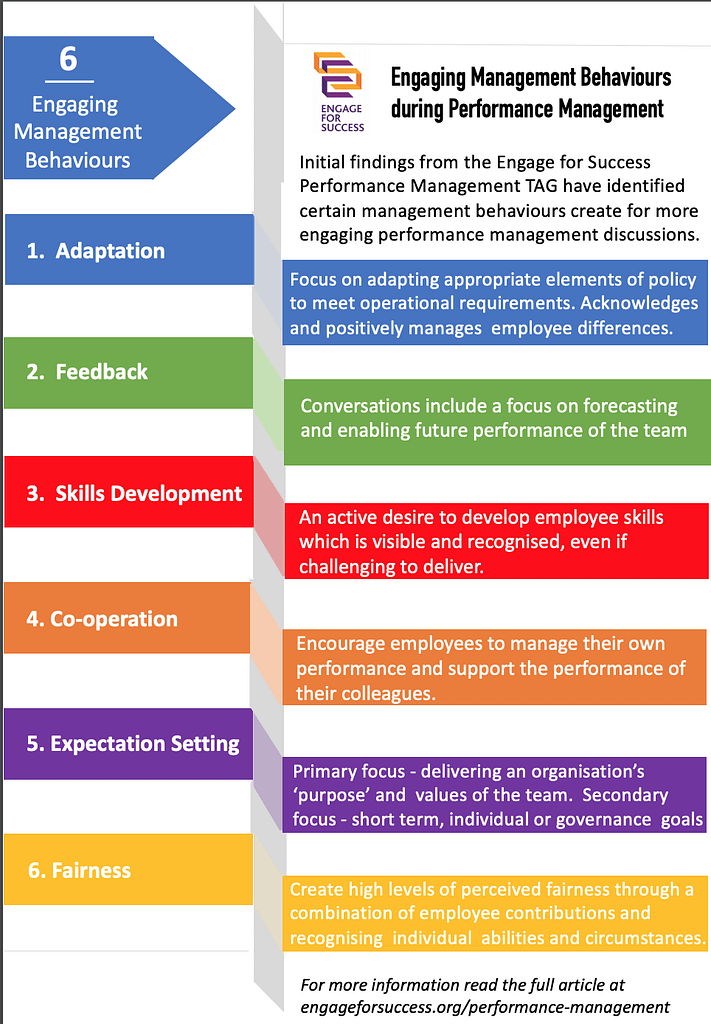Whatever stage you are at with regard to managing your teams during the COVID-19 crisis, it is likely you are going to need to consider how you can relive your organisation’s performance management process as new norms continue to evolve. The Engage for Success Performance Management Thought and Action Group (TAG) has been undertaking research to understand what behaviours do the managers of highly engaged teams demonstrate during performance management discussions. The initial research points to these six key behaviours:

1. ADAPTION
Engaging managers focus on adapting appropriate elements of policy to meet various operational requirements. For instance, if you only drive a car by reading the user manual, it would not work as it requires a sense of what is happening and adapting to the environment to be successful. If a company’s policy states quarterly meetings are required, but it is felt the team want more immediate feedback then the manager should feel able use the same tool more frequently. Engaging managers also adapt to situations; they acknowledge and positively manage conflicts or differences that come up among employees.
2. FEEDBACK
Conversations often focus on the future, not the past; This is sometimes cleverly referred to as “feedforward” as opposed to feedback. In conversations with the team, acknowledge what has happened in the past and how we can learn from what went well, recognise and appreciate this to promote this behaviour again. Where we can understand how things could be done differently, we make changes to prevent this from happening again. Hear Tony Latter, CEO of the Happiness Index on our recent EfS radio show share about some ideas on how to build feedback loops into your routine.
3. SKILLS DEVELOPMENT
Engaging managers have an active desire to develop employee skills, even if it’s challenging to deliver those training and development opportunities. Encourage the employee to take ownership for what they would like to learn to allow people to continuously improve in their teams. This will be aligned with the purpose and feedback / food forward comments
4. CO-OPERATION
Employees are encouraged to manage their own performance and support the performance of their colleagues. If emphasis is put only on individual targets and performance, or only on team performance, employees are not as engaged. Team targets will help to identify the purpose of the team and the individual targets help to identity progress towards the team goal and what support is required to the achieve overall goal.
5. EXPECTATION SETTING
The primary focus of engaging managers is to deliver the organisation’s “purpose” and values of the team. Short term, individual, or governance goals are a secondary focus. It is important to provide a clear line of site for employees to understand how their work and actions can directly impact the purpose of the organisation and they are aligned with everyone else, in the same way the cleaner at NASA new that their job was to help get a man on the moon.
6. FAIRNESS
Engaging managers create high levels of perceived fairness through a combination of employee contributions and recognising individual abilities and circumstances. One size does not fit all. Everyone has different skills or skill levels. This is the difference between equality and equity as shown in the image below. Where some people may need support on some skills, they may conversely have greater skills in other areas to support the rest of the team in return.

The initial findings are, at times, counter-intuitive, but provide guidance for managers to consider when undertaking their performance management discussions with their teams. These 6 behaviours do not seek to replace current performance management policies, but instead highlight the positive behaviours of managers of highly engaged teams during performance management which could be adopted by all.
For more information on this, you can read the full article on the initial research here. If you would like to get involved in the ongoing research, contact frazer@e-trinityconsultancy.com.




